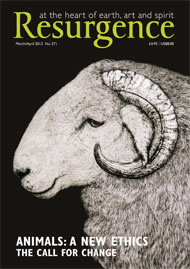The question of whether animals should have rights really resolves into the question of whether human beings, with dominion over animals, should give them protection from the deliberate harm of other humans. Protection through the law or by ethical norm.
In a perfect society, the law should reflect prevailing ethics. This is not to say that the law needs to be coextensive with ethics. There are many positive ethical obligations that are not reflected in the law. For example, under English law there is no obligation on a stranger to rescue a young child from drowning in two feet of water. Ethically it is a no-brainer. There is no law that says one must love one’s neighbour – or save an animal hit by a car. But the law should at least be consistent with ethical norms when it comes to negative obligations. The law should not permit what ethics would not.
So the first task is to construct an ethical framework, and the second to decide which part needs to go in the law. There are many competing views about ethics, of course. Some people draw inspiration from religion, others from a secular perspective of the world. Some codes stress the needs of the individual, others the common good. However, one thing is clear. Ethics are primarily about protecting from harm those who may, foreseeably, be harmed by our action (or inaction). That is why we have ethical codes. Behaviour that does not adversely affect others – such as consensual sexual relationships in private between adults – should fall outside the reach of ethics.
No sensible scientist these days disputes that non-human animals are sentient and that they have needs and desires. The only argument is about exactly what individual species experience in particular situations, and what their behavioural needs are. Because animals are capable of being harmed by human behaviour, they properly fall within the sphere of ethical concern – what Albert Schweitzer called “the circle of compassion”.
The Golden Rule finds expression in all the major religions, and in some philosophies too. It is primarily about desisting from harmful conduct. St Matthew’s Gospel says: “Do unto others as you would have them do unto you.” One of the Confucian formulations expresses it both positively and negatively: “What one does not wish for oneself, one ought not to do to anyone else; what one recognises as desirable for oneself, one ought to be willing to grant to others.” Of course, one has to make allowance for the fact that what others wish for may not be the same as what one wishes for oneself, but is there any reason why ‘others’ should not extend to animals?
Since animals can be adversely affected by our behaviour as much as other people can, the answer is surely no. Species differences would appear to be as irrelevant, in ethical terms, as racial, gender or sexuality differences. Consistency has to be the hallmark of an ethical code, if it is not to appear opportunistic or merely reflective of where power lies.
Another way of making the same point is that we should empathise as much with animals as with human victims of our behaviour. We should try to understand the impact of what we do on animals and, if it is seriously harmful, desist from it. The focus should be on the putative victim, not on what the exploiter wants. The ancient Greek poet Bion put it like this: “Boys stone a frog in sport, but the frog dies in earnest.”
It may sometimes be harder to empathise with animals, because we cannot get inside their minds, but that does not remove the need for us to try. There are many circumstances – the effect of depriving an animal of food or water, beating him or experimenting on her – where very little mental agility is required. It can also be difficult to empathise with people from a different culture or background, or even gender, because we cannot get inside their minds either. But that does not invalidate the principle.
The need to understand our effect on animals, how we treat them, so that we can empathise and behave accordingly, underlines why transparency in public debate is so important – and why full use should be made of available freedom of information laws. So much animal cruelty is out of sight, and those who are exploiting animals want to keep it that way. Steven Pinker argues in his recent book The Better Angels of our Nature that humans today are much less violent, to other humans and to animals, than in former times and that better understanding and more enlightened attitudes go a long way to explaining this.
As a general thesis this may be true – in many societies attitudes to animals have improved significantly, as they have to vulnerable groups of people. But the sad truth is that technology, allied to corporate power, has opened up new ways of exploiting animals on a truly industrial scale, especially in the factory farm and the laboratory, with the result that that there is indisputably far more cruelty to animals today than when animals received no protection from the law at all. Society needs to educate itself – and act on this shocking reality.
Of course, for society to function, we all have to put up with minor discomfort and irritation – pollution from other people’s cars, next door’s late-night party. Ethics only need to step in when the harm is significant – most obviously pain and injury to health. There is, in addition, a distinction in ethical terms between harm that is intentional and harm that is not. But again there is no reason why the general approach should be different when animals are the potential victims.
And the fact that animals cannot exercise responsibilities in the way that people can should not mean that they are not entitled to any rights, as some argue. People with severe learning disabilities cannot exercise responsibilities either, but we would not for that reason not protect them from harm. Similarly, the fact that animals cannot exercise all the rights that people can – freedom of speech, the right to vote – should not mean that they should be denied those rights they can exercise (the freedom to indulge in natural behaviour, most obviously). People with dementia may not be able to vote either, but there are other rights they can exercise and should have.
So what protection should the law give animals? As a minimum, it should protect them from action by humans that foreseeably causes them significant harm, including being deprived of their basic needs. Benefit to people should not be regarded as some kind of ethical trump card.
The problem is that, even in countries with developed animal welfare legislation, that is exactly the approach of the law, such that protection of animals stops at the point where some human interest – economic, scientific, even recreational – is engaged. A balance is struck, seen most clearly in the fact that the law often only prohibits cruelty deemed ‘unnecessary’ – which inevitably means that ‘necessary’ cruelty is legal. (And ‘necessity’ is a very elastic concept, used to justify all sorts of things.)
That is not the approach with legislation protecting people from significant harm. We do not strike a balance between the desire of slaves, for example, for freedom and the economic interests of slave-owners, or between the interests of people not to be experimented on and the needs of medical science. We simply outlaw cruel practices, focusing on the interests of the victim. So it should be with animal protection laws too.
Consistency is indeed the key. That is why one can, consistent with principle, concede that it is not always wrong to kill an animal, even though the right to life is the most fundamental right of all. Self-defence is an obvious case where nearly everyone accepts that killing an animal is ethically permitted (if there is no alternative.) But then ethical norms and indeed the law also allow a person to kill another person in self-defence. War, or at least a Thomist just war, is but collective self-defence.
In short, in matters of ethics and the law the identity of the victim should be irrelevant. The primary function of an enlightened society should be to protect the weak from the strong – and not give different answers depending on who the weak are, or what the strong want.







